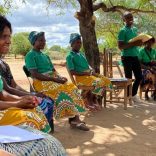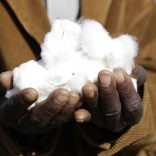FAO warns of unequal access to farm funding for women and youth in Mozambique
Mozambique harvests first genetically modified maize – Chókwè

Stock
Mozambique is currently harvesting its first genetically modified maize on an experimental plot at the Institute for Agrarian Research’s Chókwè agrarian station in the southern province of Gaza.
According to Noticias, the initiative aims to provide the sector of drought-resistant and insect-tolerant seeds.
The first growing season, characterised by abundant rainfall where the studies are being carried out, saw 14 varieties tested. They are part of the insect resistance component, aimed at combating one of the main factors contributing to low production among subsistence farmers and domestic producers, especially those without the financial resources to purchase insecticides and pesticides.
The second trial, later this year, will test drought resistant varieties. Drought, a consequence of climate changes affecting the African continent, is often responsible for the failure of maize production.
The work is being conducted by the Institute for Agrarian Research (IIAM), a governmental institution responsible for the Water Efficient Maize for Africa (WEMA) project, which includes Mozambique, Tanzania, South Africa, Kenya and Uganda through their respective agrarian research institutes.
“In this first phase we conducted trials to evaluate resistance to insects, which we have been monitoring from sowing time in February up to now,” Pedro Fato, a corn researcher at IIAM, is quoted as saying.
“Today (Monday), we are about to start the harvesting process for preliminary analyses, which are mandatory procedure in the WEMA research process implemented by the IIAM. We will look at the yield and assess to what extent the insect resistance gene works under Mozambican conditions,” he explained.
Mozambican Agrarian Research Institute director general, Olga Fafetine, said that the goal was that “in the end the country has maize seed genetically modified in order to favour the desired characteristics, both for the pest resistance component and drought tolerance”.
Testing genetically modified maize from the United States is part of a WEMA agricultural research project to develop new varieties for drought tolerance and insect resistance.
Mozambique already consumes genetically modified products imported from countries such as Brazil and South Africa, without any negative impact on human health or the environment, according to the national authorities linked to biosafety.













Leave a Reply
Be the First to Comment!
You must be logged in to post a comment.
You must be logged in to post a comment.